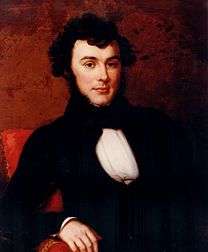George Washington Adams
George Washington Adams (April 12, 1801 – April 30, 1829) was an American attorney and politician. He was the eldest son of John Quincy Adams, the sixth president of the United States. Adams served in the Massachusetts House of Representatives and on the Boston City Council. He died of an apparent suicide at age 28.

Biography
George Washington Adams was born in Berlin, the capital of the Kingdom of Prussia, on April 12, 1801. He was a member of the distinguished Adams family. Adams was the eldest son of John Quincy Adams, the sixth president of the United States, who was then serving as a diplomatic representative of the United States, and his English-born wife Louisa Catherine Adams.[1][2] He was named for the first president. His grandfather John Adams was the first vice president of the United States and also the second president. He was born a month after his grandfather left office.[3]
Adams's grandmother, Abigail Adams, was unhappy with the decision of her son to name the child after George Washington and not after her husband. She thought the decision "ill judged" and "wrong," adding that John Adams also seemed offended.[4] John Quincy Adams's second son John Adams II (1803–1834) was named after his grandfather.
Adams graduated from Harvard University in the Class of 1821 and studied law. After briefly practicing as an attorney, he ran for state office. He was elected to the Massachusetts House of Representatives in 1826 and served one year. In 1828, Adams served on the Boston City Council.[5] He delivered an Independence Day speech, "An Oration delivered at Quincy, on the Fifth of July, 1824", which was later published as a pamphlet.[6]
Adams disappeared on April 30, 1829, while on board the steamship Benjamin Franklin in Long Island Sound during passage from Boston to Washington, D.C. He was last seen at about 2 A.M., and his hat and cloak were found on deck, leading to the conclusion that he had intentionally jumped.[7] His body washed ashore on June 10.[8][9] An alcoholic,[10] Adams had left notes hinting that he intended to kill himself;[11] he had appeared to be delusional while on the ship, asking the captain to return to shore and declaring that the other passengers were conspiring against him.[12] The consensus in news accounts of the time and among historians subsequently is that he committed suicide by drowning after he jumped from the Benjamin Franklin.[8][13][14]
Family
Adams and his brothers Charles and John were all rivals for the same woman, their cousin Mary Catherine Hellen, who lived with the John Quincy Adams family after the death of her parents. In 1828, John Adams II married Mary Hellen at a ceremony in the White House, and both his brothers refused to attend.[15]
Adams fathered an out-of-wedlock child[16] with a mistress, Eliza Dolph.[17] Dolph was the chambermaid to Dr. Thomas Welsh, the Adams family's Boston doctor. She had a child in December 1828 and was moved to another location so Adams could visit her and the baby in secrecy.[18]
Family tree
Notes
- Lewis L. Gould, American First Ladies: Their Lives and Their Legacy (2014), p. 47
- Ellis, Joseph J. First Family: John and Abigail Adams. New York: Random House, 2010: 217. ISBN 9780307389992
- McCullough 2001, p. 572.
- "From Abigail Smith Adams to Thomas Boylston Adams, 12 July 1801". Adams Papers, Massachusetts Historical Society. Archived from the original on December 24, 2019. Retrieved January 2, 2020.[This is an Early Access document from The Adams Papers. It is not an authoritative final version.]
- Massachusetts Historical Society-Adams Biographies
- "Oration-July 5, 1824-Quincy, Massachusetts". Archived from the original on March 15, 2015. Retrieved March 12, 2015.
- Whittemore, Henry (1893). The Past and the Present of Steam Navigation on Long Island Sound. New York, NY: Providence and Stonington Steamship Company. p. 42.
- Shepherd, Jack, Cannibals of the Heart: A Personal Biography of Louisa Catherine and John Quincy Adams, New York, McGraw-Hill 1980
- "We learn from Mr. Ferris, one of the Hurl Gate pilots, that the body of the late G. W. Adams, son of the late president Adams, was found yesterday afternoon on City Island, directly in front of his door". New York Evening Post. New York, NY. June 11, 1829. p. 2.
- https://www.masshist.org/adams/biographies
- Levy, Debbie (2005). John Quincy Adams. Minneapolis, MN: Lerner Publications. p. 91. ISBN 978-0-8225-0825-0.
- Teed, Paul (2006). John Quincy Adams: Yankee Nationalist. Nova Science Publishers. pp. 127–128.
- Sellers, Charles; Sellers, Charles Grier (1991). The Market Revolution: Jacksonian America, 1815-1846. New York, NY: Oxford University Press. p. 95. ISBN 978-0-19-503889-7.
- Niles, Hezekiah (May 9, 1829). "Miscellaneous: Domestic Items; George Washington Adams". Niles' Weekly Register. Baltimore, MD. p. 164.
- Paul C. Nagel, The Adams Women: Abigail and Louisa Adams, Their Sisters and Daughters, 1999, pages 236 to 238
- https://www.smithsonianmag.com/history/first-children-who-led-sad-lives-180958099/
- https://www.masshist.org/adams/biographies
- Excerpt from Report of a Trial: Miles Farmer, vs Dr. David Humphreys Storer, April 1830
Bibliography
- McCullough, David (2001). John Adams. New York: Simon & Schuster. p. 144. ISBN 978-1-4165-7588-7.CS1 maint: ref=harv (link)